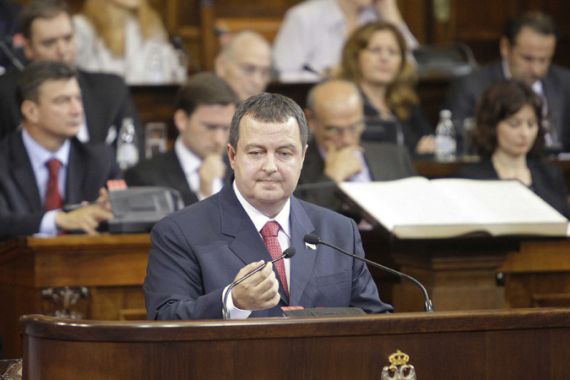Serbia’s new government to ‘focus on economy’
Incoming prime minister says ensuring economic survival is key in a Serbia he wants to be a factor of peace in Balkans.

Serbia’s incoming Prime Minister Ivica Dacic has vowed that his country will be devoted to peace and stability in the Balkans and that he is “extending the hand of reconciliation”.
Presenting his government’s programme in Serbia’s parliament ahead of a government swearing-in ceremony due to take place overnight, Dacic said on Thursday he wanted to head a country without internal divisions, but that the main task of his new government would be ensuring economic survival.
“He said the belt won’t be tightened, nor will the salaries and pensions be frozen, but Serbia needed investments”, said Al Jazeera’s Belgrade correspondent Marko Subotic.
|
“If they say the word Balkans means blood and honey, there has been enough blood. It’s time that we tasted honey.“ – Ivica Dacic |
Dacic, a former spokesman for Serbia’s late strongman Slobodan Milosevic, said Serbia would not recognise the independence of Kosovo, but that he wanted to raise the dialogue with Pristina to a higher level.
In a speech marked by talk of the economic crisis, regional co-operation and Serbia’s forthcoming path towards joining the European Union, Dacic said Serbia wanted to be a factor of peace and stability in the region and that all misunderstandings would be solved peacefully.
“If they say the word Balkans means blood and honey, there has been enough blood. It’s time that we tasted honey. Serbia is extending the hand of reconciliation to all. Let’s not dwell on the past, let’s think of the future. We want good relationships, with mutual respect of the independence and territorial integrity of all states,” Dacic said.
Dacic is head of the Socialist Party, which Milosevic once headed, until he was ousted in a popular uprising in 2000. Dacic took over the party in 2006 and has aimed to present it in a new light, away from the nationalist aspirations of the past.
He will head a coalition government which also includes the Serb Progressive Party, until recently headed by Serbia’s newly elected President Tomislav Nikolic, as well as some smaller parties.
Economic uncertainty
The incoming PM said the main aim of his new government would be strengthening Serbia’s foundations.
Highlighting economic recovery as the key aim of his government, Dacic said that all other tasks, “such as Serbia’s European future, solving the Kosovo issue, regional co-operation, the fight against crime and corruption, education, health, would depend on whether we are able to ensure the economic survival of our country”.
Serbia is facing deep economic uncertainty. The Serbian dinar hit a new low versus the euro at 119.05 on Wednesday. The dinar has lost about 9.5 per cent in value against the euro this year, battered by concern over Serbia’s rising debt of about 55 per cent and a frozen loan deal with the IMF.
Dacic highlighted the continuation of strong ties with Republika Srpska, the Serb-dominated part of Bosnia and Herzegovina, while not mentioning Bosnia itself.
Dragan Popovic, director of the Centre for practical politics in Belgrade, told Al Jazeera his statement was a continuation of earlier Serbian foreign policy.
He described Dacic’s parliamentary speech as an example of “naked populism and serving the voters”.
Popovic said Serbia’s voters were used to that from Dacic, “but saying these things as future prime minister creates uneasiness. It’s not good for a future prime minister to start with such a big dose of populism”.
Dacic, who retains his portfolio of internal affairs minister, said he would remain committed to fighting organised crime and corruption, as well as ensuring freedom of the media.
He said the rule of law would apply to all Serbs equally, be they ordinary citizens, politicians or anybody else.
He said Serbia was entering a new four-year “ballgame” filled with problems and a fight for the good of all its citizens, “but the people are the only selector, who decides whether we are good or not, whether we should be part of the team or not”.